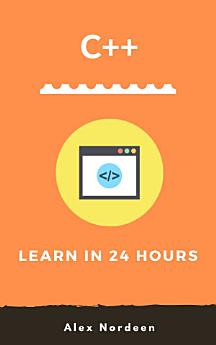Learn C++ in 24 Hours
Über dieses E-Book
Chapter 1: C++ Programming: What is C++ | Learn Basic Concepts of C++
What is C++?
Popular programming languages in use?
Is C++ best programming language?
Who uses C++?
Five Basic Concepts of C++
Use of C++ Programming Language
Chapter 2: How to Download and Install C++ IDE on Windows
What is Dev-C++?
How to Download and Install Dev C++ on Windows
Features Of Dev-C++ IDE
Chapter 3: C++ Hello World Program with Code Explanation
Hello World Program in C++
Your First Program: C++ ""Hello World!"" Explanation
Explanation of C++ Hello World Program Code
Chapter 4: C++ Variables and Types: int, double, char, string, bool
Variables in C++
Basic types of Variables in C++
Rules of Declaring Variables in C++
C++ Variable Data Types
Variable Name or Identifiers
Const Qualifier in C++
Scope of Variables in C++
Variable Type Conversion
Register Variables
Escape Sequences
Chapter 5: Arrays in C++ | Declare | Initialize | Pointer to Array Examples
What is an Array?
Why do we need arrays?
Declare an array in C++
Array Initialization
Types of Arrays
Accessing the values of an Array
Advantages of an Array in C++
Disadvantages of an Array in C++
Chapter 6: C++ Operators with Examples
What are Operators?
Arithmetic Operators
Relational Operators
Logical Operators
Bitwise Operators
Assignment Operators
Misc operator
Operators Precedence
Chapter 7: C++ For Loop with EXAMPLE
What is a For Loop?
How for loop works?
When to use a for loop?
Syntax of for loop
Example 1
Example 2
Chapter 8: C++ do…while loop with Examples
What is do-while loop?
When to use a do-while loop?
Syntax
How do-while loop works?
Example 1
Example 2
Nested Do While Loop
Chapter 9: C++ Switch Case Statement with EXAMPLE
What is a switch?
When to use a switch?
The break Keyword
Syntax
Example 1
Example 2
Chapter 10: C++ Strings: strcpy(), strcat(), strlen(), strcmp() EXAMPLES
What is a String?
Declaring Strings
Accessing string Values
String Functions:
Chapter 11: C++ Exception Handling: Try, Catch, throw Example
What is Exception Handling in C++?
Why Exception Handling?
Exception Handling Keywords
C++ Standard Exceptions
User-Defined Exceptions
Chapter 12: C++ Dynamic Allocation of Arrays with Example
What is a Dynamic Array?
Factors impacting performance of Dynamic Arrays
The new Keyword
Initializing dynamically allocated arrays
Resizing Arrays
Dynamically Deleting Arrays
Chapter 13: C++ Pointers with Examples
What are Pointers?
Addresses in C++
Pointer Declaration Syntax
Reference operator (&) and Deference operator (*)
Pointers and Arrays
NULL Pointer
Pointers of Variables
Application of Pointers
Advantages of using Pointers
Chapter 14: C++ Char Data Type with Examples
What is Char?
What is ASCII?
Char Declaration
Printing ASCII Value
Printing Char Value
Inputting Chars
Converting Character to String
Chapter 15: C++ File Handling: How to Open, Write, Read, Close Files in C++
What is file handling in C++?
The fstream Library
How to Open Files
How to Close Files
How to Write to Files
How to Read from Files
Chapter 16: C++ Operator Overloading with Examples
What is Operator Overloading?
Different Approaches to Operator Overloading in C++
Can all C++ Operators be Overloaded?
Things to Remember:
Rules for Operator Overloading:
How to Overload Operator:
Chapter 17: C++ Basic Input/Output: Cout, Cin, Cerr Example
What are Streams in C++?
How do streams work?
Function Table
C++ Header files for Input/ Output
std::cout
std::cin
std::cerr
std::clog
Error handling with IO streams:
Chapter 18: Stack in C++ STL with Example
What is std::stack?
Stack Syntax
Member Types
Operations in Stack
Stack Implementation
push() and pop()
empty(), size(), top()
emplace() and swap()
Stack in STL
Chapter 19: C++ Struct With Example
What is a Struct in C++?
When to use a Structure?
C++ Struct Initialization
Creating Struct Instances
Accessing Struct Members
Pointers to Structure
Struct as Function Argument
Limitation of a C++ structure
Chapter 20: Vector in C++ Standard Template Library (STL) with Example
What is a C++ Vector?
When to Use a Vector?
How to Initialize Vectors in C++
Iterators
Modifiers
Example 1
Example 2
Capacity
Example 3
Chapter 21: Map in C++ Standard Template Library (STL) with Example
What is std::map?
Why use std::map?
Syntax:
Member types:
Built-in Functions
Iterating over Map Elements
Inserting data in std::map
Searching in a Map
Deleting Data from a Map
Chapter 22: C++ Class and Object with Example
What is a Class?
Class Declaration
Private and Public Keywords
Object Definition
Accessing Data Members
Class Member Functions
Constructors and Destructors
Chapter 23: C++ Polymorphism with Example
What is Polymorphism in C++?
Types of Polymorphism
Compile Time Polymorphism
Function Overloading
Operator Overloading
Runtime Polymorphism
Function Overriding
C++ Virtual Function
Compile-Time Polymorphism Vs. Run-Time Polymorphism
Chapter 24: std::list in C++ with Example
What is an std::list?
Why use std::list?
List Syntax
C++ List Functions
<list> Constructors
Container properties
Inserting into a List
Deleting from a List
Chapter 25: C++ Functions with Examples
What is a Function in C++?
Why use functions?
Built-in Functions
User-Defined Functions
Function Declaration/Prototype
Function Definition
Function Call
Passing Arguments
Chapter 26: Difference between Structure and Class: Explained with C++ Example
What is Structure?
What is Class?
Syntax of Class in C++
Syntax of Structure in C++
Difference between Structure and Class
Which One Should You Choose?







